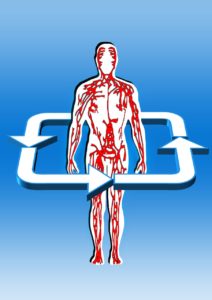Acupuncture Can Help Increase Circulation
 Acupuncture helps improve the circulatory system by stimulating energy pathways in the body and can enhance peripheral blood flow. This healing treatment began thousands of years ago in China and is still used in modern medicine.
Acupuncture helps improve the circulatory system by stimulating energy pathways in the body and can enhance peripheral blood flow. This healing treatment began thousands of years ago in China and is still used in modern medicine.
Acupuncture practitioners insert needles in various parts of the body to stimulate nerve fibers. According to the University of Maryland Medical Center, the action causes the release of hormones to the brain that may increase pain threshold, helping patients who suffer from back or neck pain and migraine headaches.
Massage Also Helps Circulation
Not only is massage a great way to relax but the pushing, kneading, and pulling all help increase circulation. As the massage therapist presses down she moves blood in a congested area and when she releases pressure new blood flows in to replenish this. By squeezing and kneading a muscle the massage therapist helps release lactic acid and improves the circulation of lymph.
Symptoms of poor circulation
The most common symptoms of poor circulation include:
- tingling
- numbness
- throbbing or stinging pain in your limbs
- pain
- muscle cramps
Each condition that might lead to poor circulation can also cause unique symptoms. For example, people with peripheral artery disease may have erectile dysfunction along with typical pain, numbness, and tingling.
Causes of poor circulation
There are several different causes of poor circulation.
Peripheral artery disease
Peripheral vascular disease (PVD) is a slow and progressive circulation disorder. Narrowing, blockage, or spasms in a blood vessel can cause PVD.
PVD may affect any blood vessel outside of the heart including the arteries, veins, or lymphatic vessels. Organs supplied by these vessels, such as the brain, and legs, may not get enough blood flow for proper function. However, the legs and feet are most commonly affected.
Peripheral vascular disease is also called peripheral arterial disease.
Over time, reduced blood flow in your extremities can cause:
- numbness
- tingling
- nerve damag
- tissue damage
If left untreated, reduced blood flow and plaque in your carotid arteries may result in a stroke. Your carotid arteries are the major blood vessels that deliver blood to your brain. If plaque buildup takes place in the arteries in your heart, you’re at risk of having a heart attack.
Blood clots
Blood clots can occur in veins or arteries, which are vessels that are part of the body’s circulatory system. While both types of vessels help transport blood throughout the body, they each function differently. Veins are low-pressure vessels that carry deoxygenated blood away from the body’s organs and back to the heart. An abnormal clot that forms in a vein may restrict the return of blood to the heart and can result in pain and swelling as the blood gathers behind the clot.
Deep vein thrombosis (DVT) is a type of clot that forms in a major vein of the leg or, less commonly, in the arms, pelvis, or other large veins in the body. In some cases, a clot in a vein may detach from its point of origin and travel through the heart to the lungs where it becomes wedged, preventing adequate blood flow. This is called a pulmonary (lung) embolism (PE) and can be extremely dangerous.
Varicose veins
Varicose veins are enlarged veins caused by valve failure. When inflamed, they become tender to the touch and can hinder circulation to the point of causing swollen ankles, itchy skin, and aching in the affected limb.
Diabetes
You may think diabetes only affects your blood sugar, but it can also cause poor circulation in certain areas of your body. This includes cramping in your legs, as well as pain in your calves, thighs, or buttocks. This cramping may be especially bad when you’re physically active. People with advanced diabetes may have difficulty detecting the signs of poor circulation. This is because diabetic neuropathy can cause reduced sensation in the extremities.
Poor circulation (blood flow) can make your foot less able to fight infection and to heal. Diabetes causes blood vessels of the foot and leg to narrow and harden. You can control some of the things that cause poor blood flow.
Obesity
The most common health-related issues caused by obesity are hypertension, diabetes and heart disease but, obesity can also lead to poor circulation which can cause blood clots.
Raynaud’s disease
People who experience chronic cold hands and feet may have a condition called Raynaud’s disease. This disease causes some areas of your body — such as your fingers and toes — to feel numb and cold in response to cold temperatures or stress. In Raynaud’s disease, smaller arteries that supply blood to your skin narrow, limiting blood circulation to affected areas.
For more information about how acupuncture and other treatments can help you, please contact the Urban Acupuncture Center Board Certified Licensed Acupuncturist’s team at Indianola Ave, Clintonville (614) 725-2488 | Main St, Westerville (614) 426-4406 or click here. Taking new patients in and around greater Columbus, Ohio.
